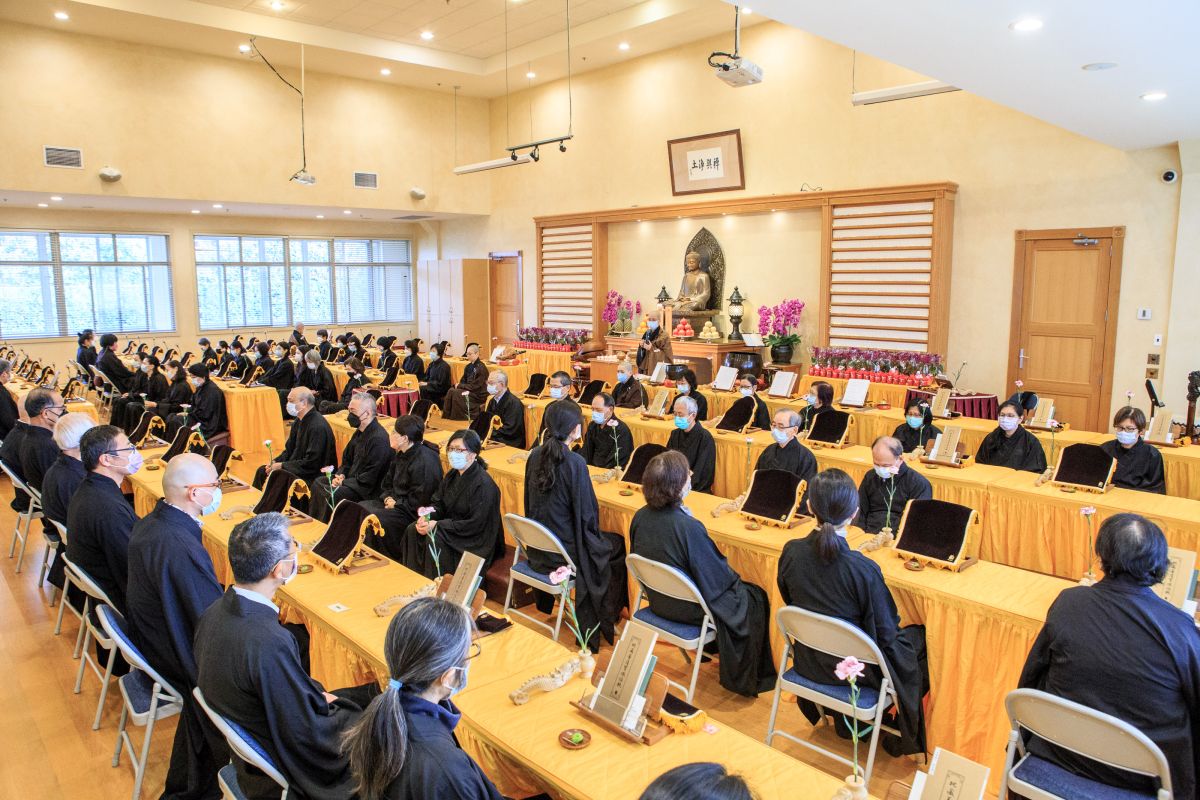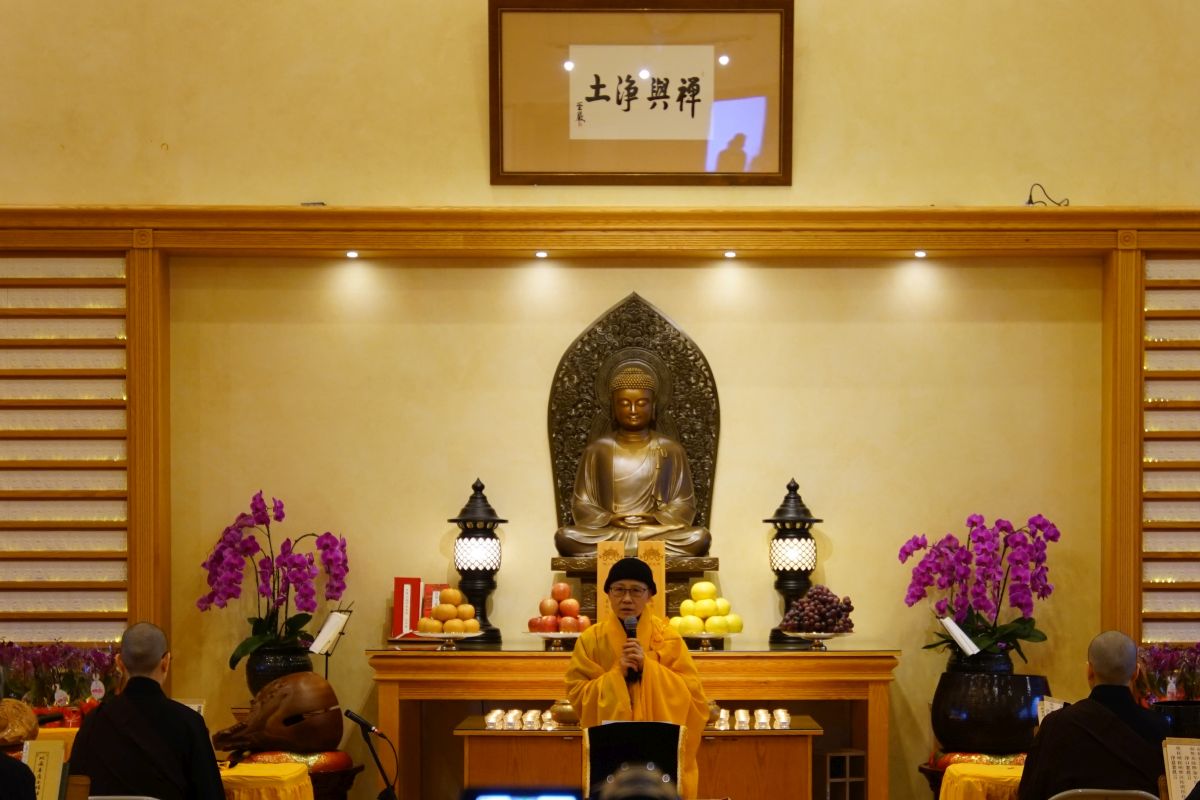DDM Global News
Tomb Sweeping Festival Dharma assembly for repaying the kindness of parents and the Three Jewels
Updated April 28, 2022
Each April, during the time of the Tomb-Sweeping Festival -- a day for Chinese people to remember their ancestors---Dharma Drum Vancouver Centre holds a special Dharma assembly for participants to repay the kindness of their parents and the Three Jewels. This year, the Centre held a Ksitigarbha Bodhisattva Repentance Ceremony and a Ksitigarbha Bodhisattva Dharma Service on April 2 and April 3, respectively. With the decline of the COVID-19 pandemic, people can now finally return to the Centre for onsite group practice, after two years of suspension. The event was conducted both in-person and virtually, with a participation of over 170 people, which demonstrates both the need and importance for such a group practice activity.
Ven. Chang Hui, timekeeper of the Dharma assembly, began with a brief Dharma talk on making offerings. She explained that, while offering fresh flowers and lamps to the Buddhas and Bodhisattvas certainly earns one great merit, the supreme offering consists in cultivating a dignified, noble mind as well as an aspiration marked by bodhicitta. The Ksitigarbha Bodhisattva Sutra is a Buddhist sutra highlighting the virtue of filial piety in terms of Buddhist faith. It contains the story of a filial daughter called Bright-Eyed, known for her great vow to save both her deceased mother and other beings suffering in hell. During the Dharma service, practitioners can repent their past misdeeds and wrongdoings, or pray for all sentient beings by praising Ksitigarbha Bodhisattva's great vows. Guided by the venerables and helped by volunteers, participants practiced diligently and single-mindedly, with purity in the body, speech and mind. They made the aspiration to become enlightened for the benefit of self and others, through liberation from karmic obstacles while engaging in practice.
 During the Ksitigarbha Bodhisattva Dharma Service, the Centre's director, Ven. Chang Wu, shared an article entitled "On the Reputation of Filial Piety (孝聞說)", written by Master Ouyi Zhixu in the late Ming dynasty, to remind the audience that filial piety represents the root of humanity and the fundamental principle for both mundane and supramundane dharmas (phenomena). Filial piety can be viewed as a sequential progression of practice: first, to take care of one's parents; secondly, to introduce them to the Dharma whenever there is a convenient opportunity; and thirdly, to help them find refuge in the Three Jewels. Buddhists should practice filial piety to their parents, teachers, and the Three Jewels. The venerable further expounded the idea of filial piety as having three levels: the first, to take care of one's own parents and make offerings to the Three Jewels; the second, to learn and practice the Buddha's teaching, thereby purifying one's bodily, verbal, and mental actions and aspiring to leave behind the cycle of birth and death; and thirdly, to ultimately generate the Bodhi mind (bodhicitta). This entails viewing all sentient beings as if they were our parents and helping them to be liberated from the destinies of suffering and eventually achieve the Buddha path.
During the Ksitigarbha Bodhisattva Dharma Service, the Centre's director, Ven. Chang Wu, shared an article entitled "On the Reputation of Filial Piety (孝聞說)", written by Master Ouyi Zhixu in the late Ming dynasty, to remind the audience that filial piety represents the root of humanity and the fundamental principle for both mundane and supramundane dharmas (phenomena). Filial piety can be viewed as a sequential progression of practice: first, to take care of one's parents; secondly, to introduce them to the Dharma whenever there is a convenient opportunity; and thirdly, to help them find refuge in the Three Jewels. Buddhists should practice filial piety to their parents, teachers, and the Three Jewels. The venerable further expounded the idea of filial piety as having three levels: the first, to take care of one's own parents and make offerings to the Three Jewels; the second, to learn and practice the Buddha's teaching, thereby purifying one's bodily, verbal, and mental actions and aspiring to leave behind the cycle of birth and death; and thirdly, to ultimately generate the Bodhi mind (bodhicitta). This entails viewing all sentient beings as if they were our parents and helping them to be liberated from the destinies of suffering and eventually achieve the Buddha path.Both Dharma assemblies finished at around past noon, so the Centre kindly prepared delicate snacks for the attendees to take home. The venerables handed out the snacks as a gesture to show their warmth and care.
Text: Qian-sheng Lin (林健深)
Photos: Dharma Drum Vancouver Centre
Translation: Vicky Wei (韋徵儀)
Editing: DDM Editing Team, Chia-cheng Chang (張家誠), Keith Brown
